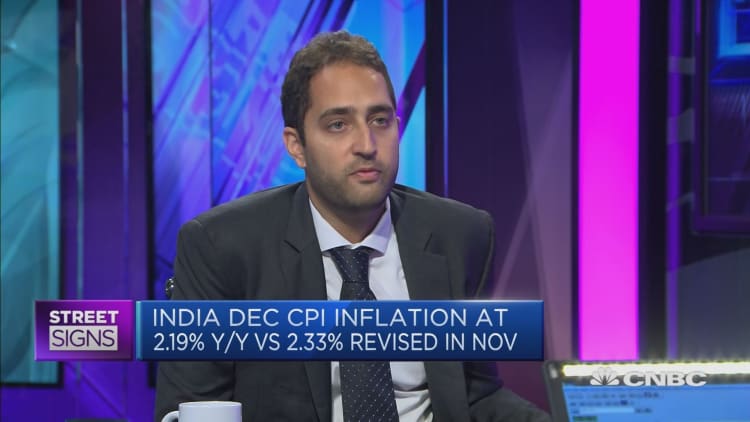
Lowering interest rates in India would be a "policy mistake" for the country's central bank, according to one economist.
According to Shilan Shah, senior India economist at London-based research consultancy Capital Economics, that's because such a move by the Reserve Bank of India could lead to higher expectations of inflation and an increased risk of actual inflation.
While the country's retail inflation did drop to an 18-month low of 2.19 percent last month, the primary driver was lower fuel prices — a "very volatile component" of the Consumer Price Index basket, Shah said. Sliding food prices have also contributed to the lower inflation rate, he noted.
But, speaking to CNBC's "Street Signs" on Tuesday, Shah said cutting interest rates would not be reflective of where India is in the economic cycle. In other words, the Indian economy is growing at a healthy clip, so any extra stimulation from the central bank risks overheating it.
"If we dig a little bit deeper, core inflation is still fairly elevated," he said. "And that's mainly a reflection of the fact that the economy has actually been performing pretty well over the past few months."
However, pressure on the central bank to cut interest rates is likely to increase with India's upcoming election, Shah said.
The ruling Bharatiya Janata Party (BJP) — Indian Prime Minister Narendra Modi's party — lost a significant seat share during the December elections in several states. Now, with the general elections right around the corner, the BJP is "not really going to leave anything to risk," Shah said.
Vote-seeking giveaways ahead of the election are very likely, he added.
In a bid to win support after unrest from farmers about falling produce prices and dwindling incomes, opposition leader Rahul Gandhi's Indian National Congress has waived billions of dollars in farm loans. Pressure has mounted on Modi's party to follow suit.
There have also been cuts to taxes on various goods and fuel, Shah said. Such giveaways would set the tone for a looser policy ahead of the general elections.
India's general election is set to be held between April and May, though no official date has yet been confirmed. The current government's five-year tenure will end by May 2019.
—CNBC's Saheli Roy Choudhury contributed to this report.

